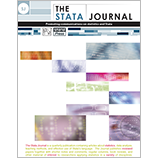Speaking Stata: Identifying spells
Abstract. Spells in time series (and more generally in any kind of one-dimensional
series) may be defined as sequences of observations that are homogeneous in
some sense. For example, a categorical variable may remain in the same
state, or values of a measured variable may satisfy the same
true–false condition. Devices for working with spells in Stata include
marking the start of each spell with indicator variables and tagging spells
with integer codes. Panel data are easy to handle with the by:
prefix. Some kinds of spell identification require two passes through the
data, as when only spells of some minimum length are of interest or short
gaps are tolerable within spells. Many questions concerning spells are easy
to answer given careful use of by: and appropriate sort order,
selection of just 1 observation from each panel or spell, and appreciation
of the many functions written for egen. Gaps before, between, and
after spells can also be important, and I suggest a convention for handling
them.
View all articles by this author:
Nicholas J. Cox
View all articles with these keywords:
spells, runs, time series, data management
Download citation: BibTeX RIS
Download citation and abstract: BibTeX RIS
|
